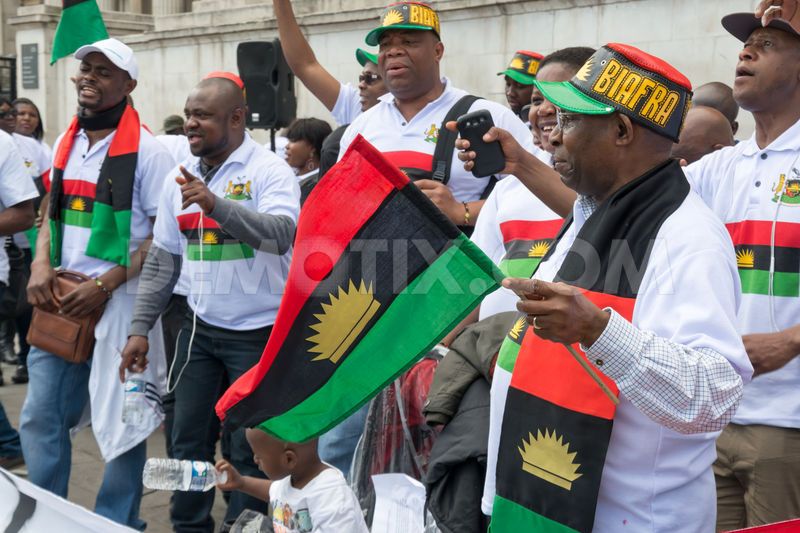* Protest movement demands independent Biafra
* Group leader’s arrest prompts anger in southeast
* New challenge for President Buhari
Nearly half a century after a civil war in which a million people died, 27-year-old Okoli Ikedi is part of a new protest movement in southeastern Nigeria calling for an independent state of Biafra.
Such calls have become common since the leader of the group Ikedi represents in Enugu, the region’s main city, was arrested in October, prompting thousands in the oil-producing southeast to join demonstrations in recent weeks calling for his release.
It’s another challenge for President Muhammadu Buhari, who is grappling with a sharp slowdown in Africa’s biggest economy, the bloody Boko Haram insurgency in the northeast and fears that militancy may resume in the oil-rich southern Delta region when an amnesty ends in December.
Like many in the surge of southeastern secessionist sentiment, Ikedi was born long after the war ended.
Displaying nothing that would betray his pro-Biafran leanings such as a flag or campaign T-shirt, to avoid unwanted police attention, the diminutive baker said poverty and high unemployment in the region were symptoms of government neglect.
“They want to make us economically poor. They believe the only way to control us is to increase our suffering,” said Ikedi in a trembling voice, adding that his group, the Indigenous People of Biafra (IPOB), wants a referendum.
The group points to basic problems to support its demands for an independent Biafra, on which presidential spokesman Garba Shehu declined to comment, adding that he was not aware that the government was doing anything on the issue.
POTHOLED HIGHWAYS
The highways that connect southeastern cities are a source of frustration for business people in the region who say the partially tarmaced roads, punctuated by potholes, should be arteries of commerce but are dangerous to navigate.
And the refuse strewn by roadsides, combined with the acrid stench of open sewers, hints at the dilapidation that has fomented discontent in the 45 years since the civil war ended.
The 1967-70 conflict followed a secessionist attempt by the eastern Igbo people. Most of the million who lost their lives died from starvation and illness rather than violence.
Now, like then, Igbos say they have been marginalised – excluded from key government posts and denied vital funding for infrastructure development, schools and hospitals.
IPOB leader Nnamdi Kanu – an activist who divides his time between the UK and Nigeria, spreading his ethos on social media and Radio Biafra – was arrested last month on charges of criminal conspiracy and belonging to an illegal society.
Political analyst Okereke Chukwunolye said the decision to arrest Kanu, previously a little known figure whose social media following outweighed actual support on the ground, was a mistake because it “increased his popularity and made him more visible”.
The sight of the red, black, green and yellow Biafran flag at largely peaceful protests in the southeastern cities of Port Harcourt and Aba, and the capital, Abuja, has prompted secessionist debates in newspapers, on radio and social media.
“The issues that brought about the Biafran-Nigerian civil war have remained unresolved,” said Chukwunolye.
In the 1960s, Enugu – which was the capital of Biafra – became known for its coal production which created jobs, as did steel, cement and gas industries.
“NO VICTOR, NO VANQUISHED”
When the civil war ended, Yakubu Gowon, the general who led the government side to victory over Biafra, declared that there should be “no victor, no vanquished”, in a pledge of reconciliation. But the Igbos feel left behind.
Local people say the demise of Enugu’s industries, a decline that coincided with the oil boom in Africa’s top crude producer, led to widespread unemployment and was a consequence of the federal government failing to fund projects in the region.
At a market in Asata, an impoverished city centre district of Enugu, it is hard to find anyone who supports the government.
“Why can’t you leave a slave to go?” asked vegetable stall holder Victoria Emelue in response to the question of secession, raising her voice above the cacophony of traders, shoppers and blaring music.
She said her three children – all graduates in their twenties – had been unable to find work, prompting her to be fearful about the future.
“Of course I’m in support of Biafra,” said 28-year-old wholesale food trader Uchenna Ede. “If we are freed, the eastern part of Nigeria would have a huge turnaround.”
A common complaint is that Nigeria’s presidents have tended to come from the north or southwest – areas dominated by Hausa and Yoruba people – which, some say, has led to Igbos not being appointed to influential government positions.
The constitution says there must be a minister from each of Nigeria’s 36 states, but the presence of a Muslim northerner as president with a Yoruba vice-president, Yemi Osinbajo, has been cited as evidence that the north and southwest remain dominant.
It’s a reminder of the complex alchemy that brings together 170 million people in Africa’s most populous nation, split roughly equally between Christians and Muslims across around 250 ethnic groups, who mostly co-exist peacefully.
Tensions are rising. IPOB campaigners say they are committed to peaceful protests, but their demonstrations prompted the military to issue an “unequivocal warning” that efforts to bring about the “dismemberment of the country” would be crushed.
Chukwunolye said it was unlikely that Igbo anger would result in bloodshed, in stark contrast to Boko Haram militants who have killed thousands and displaced 2.1 million people since 2009 in an attempt to set up an Islamic state in the northeast.
“There is no separatist movement – it is just an agitation by some youth elements,” he said. “Those who were involved in the thick of the Biafran struggle will never wish to see war again.” (Writing by Alexis Akwagyiram; Additional reporting by Anamesere Igboeroteonwu, Camillus Eboh, Felix Onuah and Buhari Bello; Editing by Ulf Laessing and Giles Elgood)
Reuters














